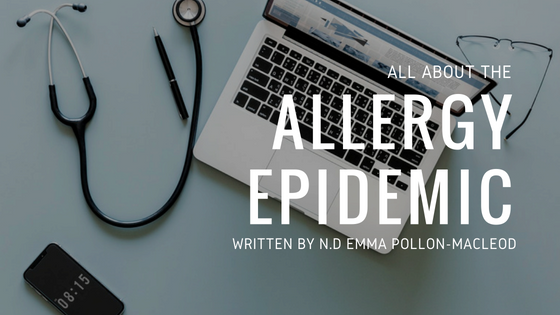
The Allergy Epidemic
Share
Reacting to anything and everything?
“I am a super sensitive person and I react to most new supplements, medications, and can’t tolerate a variety of foods”. I hear this statement a lot from patients and it is often my first clue that I should be investigating their allergic history.
People will often describe instances of swelling, flushing, redness, itching, congestion, and possibly hives after encountering a strong scent, consuming a new medication, being outside, or even just out of the blue. Sometimes the signs are not so obvious. People with mast cell and or histamine issues can also present with a variety of symptoms that can make these conditions very difficult to diagnose. Gastrointestinal issues such as severe heartburn or nausea after eating are often reported as symptoms. Joint pain and/or migrating pain after eating or being exposed to a scent can also be a big complaint for some people.
My reaction history
The first time I had a strange reaction occurred after an Organic Chemistry lab during my undergraduate degree. We were making a particularly strong compound that day in the lab. I felt ok after the lab and decided to work out. While I was on the treadmill I felt my face and body get super hot and my ears felt really itchy. I got off the treadmill and didn’t recognize myself when I looked in the mirror. My face had completely swelled up.
Fast forward four years later to my days living in Toronto completing my Naturopathic Medical Degree. I had another episode of itching, congestion, and major face swelling. This time I didn’t know the trigger as I had just been walking to school. I was with a friend and she had been completely fine. My reaction was much more severe this time. My entire body was covered in hives, my eyes had swollen shut, and I was extremely uncomfortable in my own skin. It took a week for my facial swelling to come down and return to normal.
One day several weeks later I started to notice the facial itching and swelling again. However, this time I also noticed a tightness in my chest and an audible wheeze on breathing. Again, this time I could not narrow down a trigger.
These reactions continued, sometimes weeks or months apart. Each time I had one I would notice more tightness in my chest and wheezing on breathing. I was prescribed a puffer and an Epipen and was told to keep Benadryl on me at all times. This covered me for when I felt a reaction coming on but gave me no answers as to what was causing my reactions and how I could possibly prevent them.
A reactive population
When I started talking about my experience I soon realized that I was not alone. Everyone I spoke to seemed to have someone they knew that had experienced a similar reaction, again most of them without known triggers. When I started seeing patients and began to ask about flushing, swelling, and reactions, I was shocked at how many people answered, “yes”.
Mast Cells – the Histamine gatekeeper
The allergist I had seen in Toronto ran some routine blood work on me when we were trying to determine what was triggering these reactions. The two tests that spiked my interest were Histamine and tryptase. I had heard of Histamine but never thought to measure it and tryptase was completely new to me. Many hours of research later, I had narrowed my focus down to mast cells.
Our body has a type of immune cell called the Mast Cell. These cells contain compounds such as heparin, tryptase, and histamine (among hundreds of other compounds). When your body encounters certain proteins or immune molecules they bind to receptors on mast cells causing them to break open and release their contents, including histamine. Histamine is actually the major compound that drives an allergic response (hence why we take anti-histamines when we are having a reaction).
Histamine gets into the bloodstream and causes a variety of effects, such as opening of the blood vessels. This leads to redness, itching and heat. Histamine also causes increased secretions such as congestion and stomach acid. It can also irritate the airways and throat. Some reactions don’t cause the classic itching and swelling but can present with heartburn, flushing, anxiety, and heart palpitations.
More about Mast Cells
Sounds pretty simple right? Well it turns out that there are a lot of complicating factors. It would be simple if mast cells only contained histamine and they only had receptors for pollens, dust, and ragweed. However mast cells have hundreds of receptors on them and can break open (degranulate) from many different stimuli, releasing their contents into the blood stream. They also contain hundreds of different compounds each having different effects on the body. Mast Cells can also degranulate from physical stimuli such as heat, cold, or pressure.
Why the reactions?
Every human has mast cells in their system but not everyone experiences allergic reactions. There are a couple reasons behind why someone is susceptible to reactions:
- They have an abnormally high amount of mast cells. This is referred to as “Mastocytosis” and is a very severe condition.
- They have abnormally behaving mast cells that are ‘hyper-reactive’. This is known as Mast Cell Activation Syndrome (MCAS)
- Their body cannot metabolize or break down histamines efficiently enough to quell a reaction.
What can I do?
Individualized treatments work best for highly sensitive and reactive patients. We often have to start very slow and gradually introduce therapeutics. Diet and microbiome work is also an essential part of treatment. Reducing histamine load can also be extremely useful.
For more information about our clinic and how you can book today visit www.nutrichem.com




